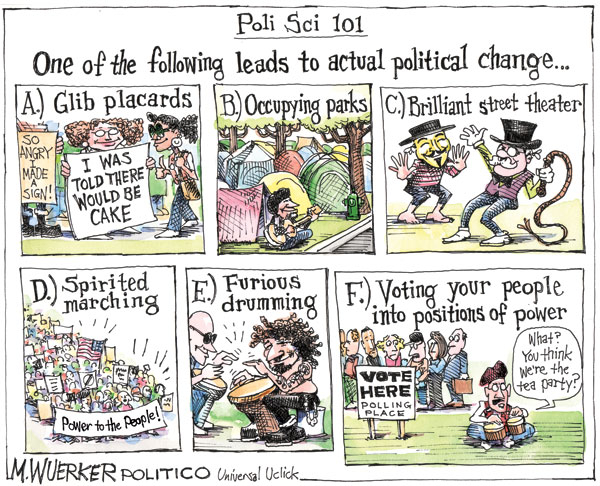Creation and Labor as Sources of Property Rights and the Danger of Metaphors
(Austrian) Economics, IP Law, Libertarian TheoryCanadian libertarian Michael McConkey has an interesting fictional exchange between himself and Socrates up at My Dinner with Socrates:
The other day I met this sandal-wearing, hipster dude who thought he had all the answers (and questions), but I set him straight when it came to the morality of the state. I thought you might enjoy reading a transcript of our dinner conversation.
Here is an edited version of a note I sent him about this piece.
Not bad, but I think you go astray by saying creation is a source of ownership. It’s not. This is the mistake people make that leads them to support intellectual property. In fact the only source of ownership is homesteading or original appropriation: finding some unowned thing and appropriating it. And, this implies that there is a second way to own something: by contractual transfer of title from a previous owner. That is it.
It is true that you can create wealth or value by production. But this just means to transform (with creativity and labor) something you already own. To produce you have to already own the thing you rearrange.
Creation is a source of wealth. Not of ownership or property rights.
Likewise, your comment here:
We don’t just use up our life – perhaps we do that when we go for a hike, say – but property is an enduring embodiment of our life. The tomato I grow in my back yard, the book I write, the money I am paid by an employer for the productive work I provide, are all embodiments of my life. My finite time, energy and attention are literally embodied in these things and stuff: tomatoes, books, money, etc.
is imprecise and overly metaphorical. The use of “literally” is wrong. I know what you are getting at but this is not rigorous argument. If I steal from you the loaf of bread you have baked, it is wrong becuase it is your property (or more precisely, you have a property right in the loaf of bread). It’s only a metaphorical way of looking at it to say that I have stolen your “labor”. It’s just literally not true. You don’t own your labor; it is not “in” the bread. Labor is just a type of action. You don’t own your labor any more than you own your actions or your memories or your tendency to procrastinate.
For more on the creation stuff, see my Against Intellectual Property; also Locke on IP; Mises, Rothbard, and Rand on Creation, Production, and “Rearranging”; Libertarian Creationism; Rand on IP, Owning “Values”, and “Rearrangement Rights”; Locke, Smith, Marx and the Labor Theory of Value; this comment to “Trademark and Fraud”; Elaborations on Randian IP; Objectivists on IP.
For the danger of misuse of metaphors, see Thoughts on Intellectual Property, Scarcity, Labor-ownership, Metaphors, and Lockean Homesteading and On the Danger of Metaphors in Scientific Discourse.
Creation and Labor as Sources of Property Rights and the Danger of Metaphors Read Post »


